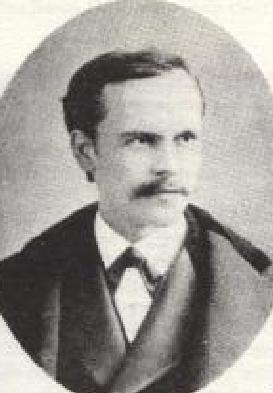| Against Authority | page 80 |
|
Benjamin Tucker
 Benjamin Tucker was a synthesizer and popularizer of individualist anarchist thought. He combined the American liberal anti-statism of Jefferson, Paine, and Thoreau, Warren's sovereignty of the individual, the natural law and libertarian logic of Spooner, the liberal minarchism of Herbert Spencer, the free banking of Proudhon and William B. Green and Spooner, and later the egoism Max Stirner. With such eclectic tastes, he was tolerant of other anarchist views, as he had to be as editor and publisher of the longest-running English-language anarchist periodical. Yet, he demanded logically consistent "plumb-line" anarchism; as Voltairine de Cleyre wrote, Tucker could "send his fine hard shafts among friends and foes with icy impartiality, hitting swift and cutting keen - and ever ready to nail a traitor."
Benjamin Tucker was a synthesizer and popularizer of individualist anarchist thought. He combined the American liberal anti-statism of Jefferson, Paine, and Thoreau, Warren's sovereignty of the individual, the natural law and libertarian logic of Spooner, the liberal minarchism of Herbert Spencer, the free banking of Proudhon and William B. Green and Spooner, and later the egoism Max Stirner. With such eclectic tastes, he was tolerant of other anarchist views, as he had to be as editor and publisher of the longest-running English-language anarchist periodical. Yet, he demanded logically consistent "plumb-line" anarchism; as Voltairine de Cleyre wrote, Tucker could "send his fine hard shafts among friends and foes with icy impartiality, hitting swift and cutting keen - and ever ready to nail a traitor."Tucker became familiar with American individualist anarchism when he was a student at MIT in 1872, after Ezra Heywood introduced him to William B. Greene and Josiah Warren. He went on to translate Proudhon's What is Property? and Max Stirner's The Ego and His Own into English, and published articles by anarchists from all over the world in his periodical Liberty. There were ongoing discussions of intellectual property, natural rights vs. egoism, and other theoretical issues, as well as reviews of anti-statist literature.
The purpose of Liberty, boiled down to its ultimate essence, is the abolition of authority. Liberty denies the authority of anybody's god to bind those who do not accept it through persuasion and natural selection. Liberty denies the authority of anybody's State to bind those who do not lend voluntary allegiance to it. Liberty denies the authority of anybody's 'public opinion', 'social custom', 'consensus of the competent', and every other fashionable or scholarly despot, to step between the individual and his free option in all things. - Benjamin Tucker, "Liberty"Liberty lasted for 27 years, from 1881 to 1908, when Tucker's print shop tragically burned down. He published authors ranging from Herbert Spencer and Auberon Herbert, to George Bernard Shaw and Frederick Nietzsche, in addition to articles by his cohorts Victor Yarros, Lysander Spooner and William B. Greene. A list of his contributors is a who's who of anarchism of the time. Tucker explained what anarchism was and was not, rejecting the legal utopian view that protection agencies and laws were unnecessary. In this important sense, he agreed with Molinari and those who would later be called anarcho-capitalists.